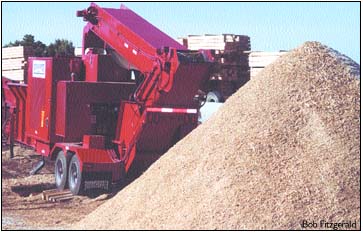|
April 24, 2001
By Jim Mimiaga Since 1980, the number of timber and milling companies in Montezuma County has declined nearly 400 percent, going from some 18 small-time operations to just a handful today. Recently a local log-home company shut down because of a shortage of affordable timber sales. And regionally, mills relied upon by independent loggers and contractors have scaled back or may be shut down, including U.S. Forest Industries in South Fork and Louisiana-Pacific of Olathe. The reason, says Carla Harper, the countyís assistant federal-lands coordinator, is a limited supply of marketable timber, combined with tough competition from larger mills bidding on local sales. "Most of what is available is small-diameter, which is a tough market because your mill has to be set up to handle smaller cuts," Harper explained. "So only the larger mills with the latest in technology can afford to take the risk." Intermountain Forest Products of Montrose has invested in new milling equipment targeting the smaller-tree market and ends up picking up a lot of local sales, Harper said. Retooling machinery to handle small-diameter products is too cost-prohibitive for family-run operations, though. The U.S. Forest Service organizes limited timber sales for the San Juan National Forest, but the product for this region, mostly small-diameter pine, fir, and aspen, makes it a hard sell. "Itís a tough business to survive in," said Mark Krabath, a forester with the San Juan National Forest. "Many have dropped out because the market is just not there, or the retooling is too costly." But even as some mills go under, a modest resurgence is forthcoming, inspired by creative timber entrepreneurs who are turning so-called "waste woods" into innovative products and profits. Harold Ragland, owner of Stoner Top Mills Inc., recently invested in a rotor chopper to process leftover wood that otherwise would have been burned. The unit creates wood chips in three different sizes that are then sold for use in landscaping, erosion control and pellet stoves. "I wanted to figure out a method to eliminate the waste, and the liability, that my operation was generating, in order to be more efficient," Ragland said. "There are a lot of different uses for these chips, but I needed the equipment to turn what I wasnít using into a more sellable product." Aspen-furniture sales are also doing well locally, as is the market for aspen paneling. Even the omnipresent Gambel oak, considered a nemesis by many, is being tapped for good use, said Duane Jessee of Rocky Mountain Aspen Wood Products. "The scrub oak has only really been used as a firewood, but Iíve found it to be a very beautiful hardwood for furniture," Jesse said. Logsmith Homes of British Columbia creates affordable homes made from low-grade waste-wood parts that can be assembled in just two weeks. The unique construction technique, pioneered by owner Bill Smith, cuts discarded wood into measured pieces that are finger-jointed, glued or laminated to form together as blocks. The blocks, which contain high-grade insulation in the middle, are easily fitted together forming the structure. The classy, all-wood homes cost substantially less than conventional homes per square foot, and are accepted by construction-trade associations and bankers. Check out these and other wood products at the Montezuma County Home Show, scheduled for Saturday and Sunday at the county fairgrounds. |
||
|
Copyright © 2001 the Cortez Journal.
All rights reserved. |
